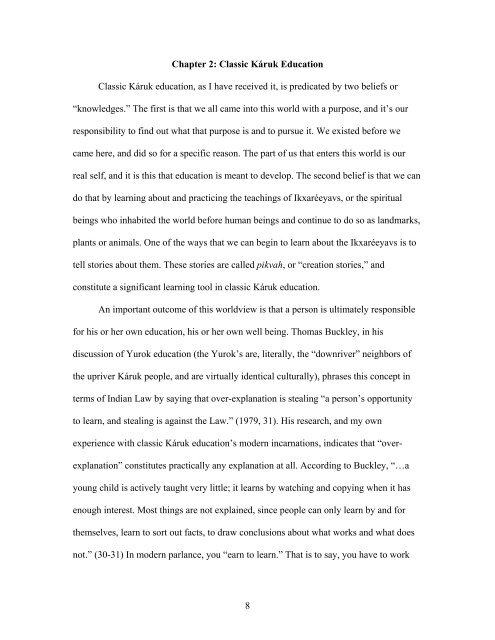The Intersection of Karuk Storytelling and Education
The Intersection of Karuk Storytelling and Education
The Intersection of Karuk Storytelling and Education
Create successful ePaper yourself
Turn your PDF publications into a flip-book with our unique Google optimized e-Paper software.
Chapter 2: Classic Káruk <strong>Education</strong><br />
Classic Káruk education, as I have received it, is predicated by two beliefs or<br />
“knowledges.” <strong>The</strong> first is that we all came into this world with a purpose, <strong>and</strong> it’s our<br />
responsibility to find out what that purpose is <strong>and</strong> to pursue it. We existed before we<br />
came here, <strong>and</strong> did so for a specific reason. <strong>The</strong> part <strong>of</strong> us that enters this world is our<br />
real self, <strong>and</strong> it is this that education is meant to develop. <strong>The</strong> second belief is that we can<br />
do that by learning about <strong>and</strong> practicing the teachings <strong>of</strong> Ikxaréeyavs, or the spiritual<br />
beings who inhabited the world before human beings <strong>and</strong> continue to do so as l<strong>and</strong>marks,<br />
plants or animals. One <strong>of</strong> the ways that we can begin to learn about the Ikxaréeyavs is to<br />
tell stories about them. <strong>The</strong>se stories are called pikvah, or “creation stories,” <strong>and</strong><br />
constitute a significant learning tool in classic Káruk education.<br />
An important outcome <strong>of</strong> this worldview is that a person is ultimately responsible<br />
for his or her own education, his or her own well being. Thomas Buckley, in his<br />
discussion <strong>of</strong> Yurok education (the Yurok’s are, literally, the “downriver” neighbors <strong>of</strong><br />
the upriver Káruk people, <strong>and</strong> are virtually identical culturally), phrases this concept in<br />
terms <strong>of</strong> Indian Law by saying that over-explanation is stealing “a person’s opportunity<br />
to learn, <strong>and</strong> stealing is against the Law.” (1979, 31). His research, <strong>and</strong> my own<br />
experience with classic Káruk education’s modern incarnations, indicates that “overexplanation”<br />
constitutes practically any explanation at all. According to Buckley, “…a<br />
young child is actively taught very little; it learns by watching <strong>and</strong> copying when it has<br />
enough interest. Most things are not explained, since people can only learn by <strong>and</strong> for<br />
themselves, learn to sort out facts, to draw conclusions about what works <strong>and</strong> what does<br />
not.” (30-31) In modern parlance, you “earn to learn.” That is to say, you have to work<br />
8
















